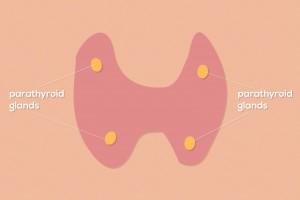 What Are the Parathyroid Glands?
What Are the Parathyroid Glands?
Peppered throughout the human body are small organs known as glands. These organs have a complex and important job without which we couldn’t survive. They produce hormones that keep the body functioning properly.
Among the most critical are the endocrine glands. These include the pituitary gland, which secretes hormones regulating growth, pain relief and sex function, among others, and the adrenal glands, which produce stress hormones. Another key member of this group is the thyroid gland, which regulates the body’s use of energy, creation of proteins and sensitivity to other hormones.
About the Parathyroid Glands
The parathyroid glands are attached to the thyroid, but despite the similar names, they play a different role. The parathyroids are usually located on the back surface of the thyroid, in the portion of the neck between the Adam’s apple and the collarbone. There are typically four of them.
These small glands release a substance known as parathyroid hormone, or PTH. Its primary purpose is to regulate the body’s blood calcium levels, a task it shares with the thyroid. It also has an effect on the body’s absorption of phosphate. See the picture below for thyroid and parathyroid gland anatomy.

The thyroid gland produces a hormone called calcitonin that limits the level of calcium in the blood. PTH works as an antagonist to this hormone and together they keep calcium levels within a very narrow range. PTH also increases phosphate absorption by activating vitamin D in the kidney.
The parathyroid glands, like the thyroid, come with their own set of disorders. Overproduction of hormones by the thyroid can lead to the well-known conditions hypothyroidism and hyperthyroidism. Less well-known are the conditions hypoparathyroidism and hyperparathyroidism.
Underactive Parathyroid
Hypoparathyroidism occurs when the parathyroids produce too little PTH. This results in low blood calcium levels, which in turn results in symptoms including cramping, involuntary muscle spasms and unpleasant tingling. Headaches, insomnia, abdominal pain, fatigue and bone pain are also possible.
Hypoparathyroidism is a serious condition and it can cause medical emergencies, including seizures, irregular heartbeats and respiratory failure. There are a number of possible causes, such as removal of the parathyroid glands during surgery, autoimmune disorders, hemochromatosis and magnesium deficiency, among others. It can also be inherited.
Overactive Parathyroid
Hyperparathyroidism, meanwhile, results from an overproduction of PTH. Primary hyperparathyroidism occurs when the glands actually malfunction. This can be caused by hyperplasia (increased cell production), adenoma (a benign tumour) or, in extremely rare cases, carcinoma (cancer) of the parathyroids. Patients with bipolar disorder who take lithium long-term are also at greater risk for primary hyperparathyroidism, since that drug can lower calcium levels, leading to stimulated production of PTH.
Secondary hyperparathyroidism is caused by any medical condition that leads to lowered calcium levels in the blood. Chronic kidney failure and vitamin D deficiency are the most common factors leading to this disorder.
About half of all patients with hyperparathyroidism are identified by medical tests before they show any signs. Low calcium rarely causes overt distress though depression, bone pain, osteoporosis, nausea, decreased appetite and kidney stones are among the possible symptoms. Bone loss is possible.
If you have questions or concerns about thyroid problems see your local doctor who will arrange for you to see a thyroid surgeon.
For more information about the parathyroid glands click here.
